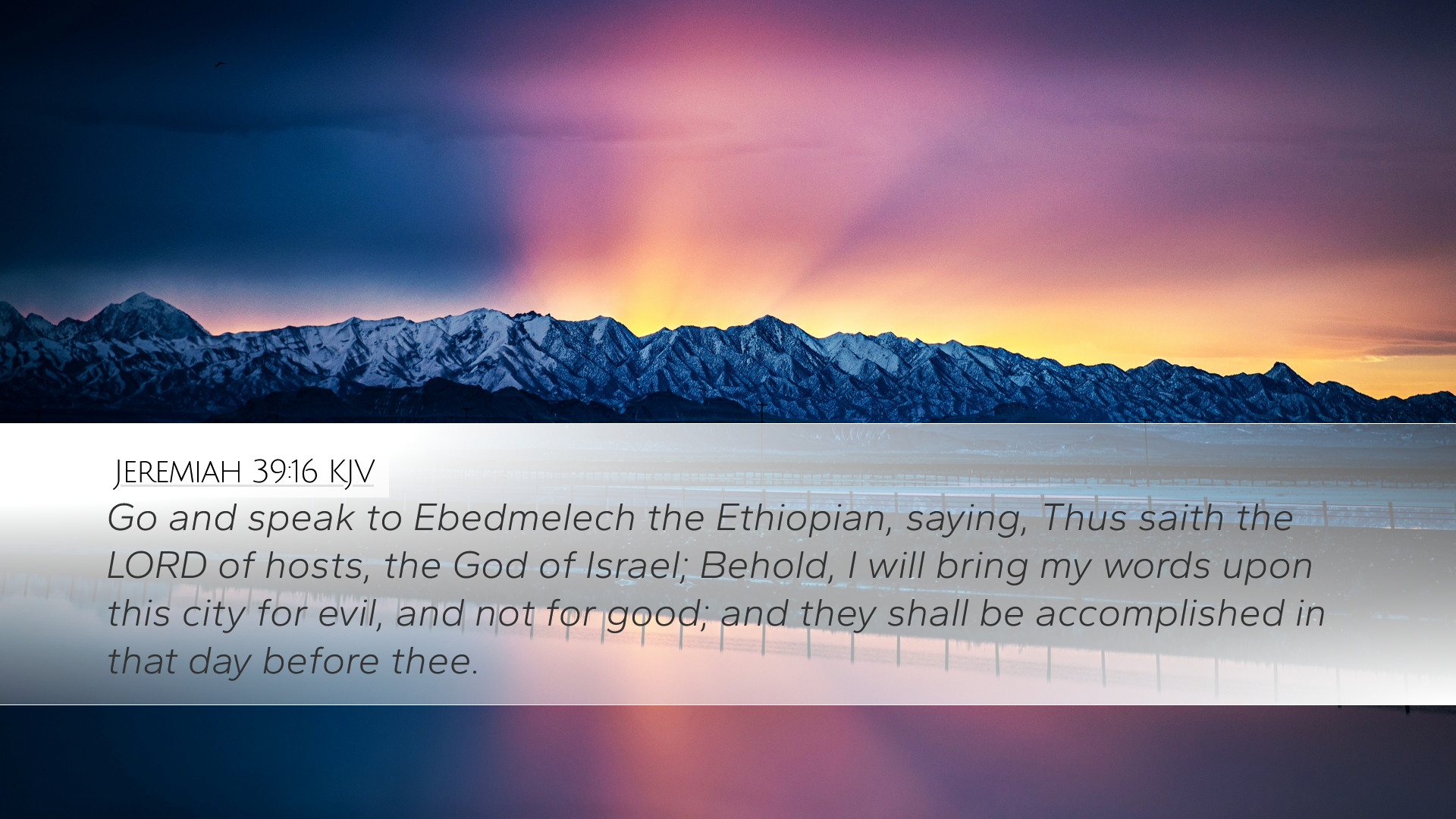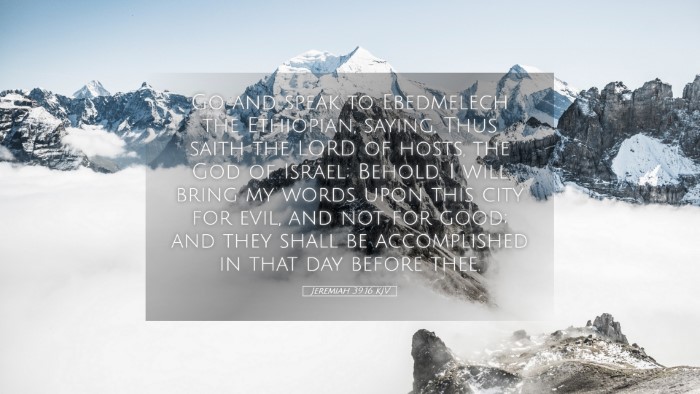Bible Commentary on Jeremiah 39:16
Verse: "Go, and speak to Ebed-melech the Ethiopian, saying, Thus saith the LORD of hosts, the God of Israel; Behold, I will bring My words upon this city for evil, and not for good; and they shall be accomplished in that day before thee."
Introduction
This verse forms a crucial part of the narrative in the Book of Jeremiah, especially reflecting God's providential care amidst impending judgment. It underscores God's sovereignty and the specific message of hope for Ebed-melech, a foreign servant who intervened to save the prophet Jeremiah. The prophetic word delivered here is vital for understanding both God's judgment and His mercy.
Historical Context
Jeremiah's ministry took place during the tumultuous period leading up to the fall of Jerusalem in 586 B.C. This verse occurs after the Babylonian siege when Jeremiah was imprisoned. Ebed-melech, an Ethiopian eunuch, plays a unique role as a Gentile who shows kindness to Jeremiah. The historical setting amplifies the significance of God communicating this message directly to Ebed-melech.
Interpretation and Commentary
Matthew Henry’s Perspective:
Henry observes that Ebed-melech is mentioned specifically to assure him of God’s protection amidst the chaos of Jerusalem's fall. God communicates His plans for both judgment and redemption. Jeremiah's message indicates that, despite the calamities that will befall Jerusalem, Ebed-melech will witness the fulfillment of God's words in his own lifetime, thereby emphasizing God's faithfulness to those who trust Him.
Albert Barnes’ Insights:
Barnes highlights the grace extended to Ebed-melech, providing a clear contrast to those facing judgment in Jerusalem. He interprets God’s words as a promise of solace and safety—a certain appointment designed to demonstrate that God's oversight extends even to the marginalized. Ebed-melech’s actions are rewarded by God's assurance of deliverance, showcasing that God honors those who honor His prophets.
Adam Clarke’s Commentary:
Clarke brings attention to God’s omnipotence and the seriousness of the context. He interprets the phrase "I will bring My words upon this city" as a continuation of God’s prophetic plan, which is inevitable and will come to pass. Clarke elaborates on the nature of prophecy, focusing on the assurance given to Ebed-melech that he will escape the coming disaster, a testament to God’s mercy that extends beyond the boundaries of Israel.
Theological Implications
This passage reflects profound theological insights integral to understanding God's character and nature.
- Sovereignty of God: The passage affirms that God is in control of history and divine judgment. His declarations are accomplished according to His will.
- Divine Mercy: Ebed-melech’s story exemplifies the mercy of God, emphasizing that even in judgment, God provides hope and deliverance for those who seek Him.
- Inclusivity of God's Grace: The mention of an Ethiopian highlights God's grace transcending cultural and ethnic boundaries, reinforcing the idea of His care for all people.
Application for Life and Ministry
This verse serves as a powerful reminder for pastors, students, and theologians about the relevance of God's promises amid challenges.
- Encouragement in Intercession: Just as Ebed-melech acted on behalf of Jeremiah, believers are called to intercede for those suffering and marginalized.
- Faithfulness in Proclamation: Ministers are encouraged to proclaim God’s word with faith, knowing that His promises will come to fruition, even when circumstances appear dire.
- Awareness of Divine Presence: Believers must recognize God's presence in their lives, particularly during trials, and trust in His plans for goodness and justice.
Conclusion
Jeremiah 39:16 serves as an important reminder of God's intricate plan of salvation and grace at both individual and national levels. The assurance given to Ebed-melech reflects hope amidst devastation, urging readers toward deeper trust in God's sovereignty and love.


